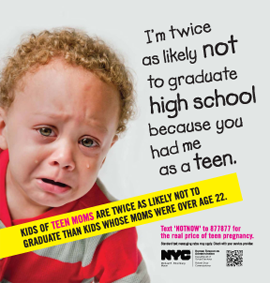
They say that the road to hell is paved with good intentions. Sometimes the road to the abortion clinic is, too.
On my morning commute, I often notice a subversive, perhaps unintentional anti-family theme among the New York City subway ads. “Family Optional,” reads a New York Lottery Family Feud ad, while a Manhattan Mini Storage sign laments, “Raising a baby in a NYC apartment is like growing an oak tree in a thimble.” I have often seen both of these ads, side-by-side with Choices Women’s Medical Center abortion clinic ads, in a single subway car. A new, more blatant set of advertisements, however, is particularly disturbing – and these are funded by the City.
In an effort to reduce teen pregnancy, Mayor Bloomberg has launched a new series of ads that emphasizes the negative sides of teen pregnancy. The campaign shows the high costs of teen pregnancy to both teen parents and their children. The campaign boasts “ads with hard-hitting facts about the money and time costs of parenting, and the negative consequences of having a child before you are ready.”
“Got a good job? I cost thousands of dollars each year,” says one advertisement over a picture of a baby girl.
“Dad, you’ll be paying to support me for the next 20 years,” says another with a picture of a frowning curly-haired toddler.
The advertisements give subway passengers a number to text “for the real price of teen pregnancy.” The phone number provides teenagers with information, quizzes, and even a choose-your-own-adventure-style game that follows the story of Louis and Anaya, two 16-year-olds facing an unplanned pregnancy. Here are some scenarios from the game:
My mom and dad are so mad that I am pregnant. Should I yell at them or just go to my room and cry? Text “Yell” or “Cry”
Waitressing is hard! My mom came in today and cried when she saw me. Should I study extra hard or drop out of school? Text “Study” or “Drop”
 Anaya faces other decisions about ending friendships, not being able to afford college, and leaving her boyfriend Louis. Similar to the subway advertisements, all of the scenarios are negative.
Anaya faces other decisions about ending friendships, not being able to afford college, and leaving her boyfriend Louis. Similar to the subway advertisements, all of the scenarios are negative.
While his intentions may be good, Bloomberg is likely influencing unintended audiences. What about the teens who are already pregnant? What about those struggling with the choice of continuing a pregnancy? An entirely negative picture of pregnancy is not only inaccurate, but harmful. Girls facing unintended pregnancies – and even those who are not pregnant – know that children are both financially and emotionally costly. What those young women need is care, not additional scares from their community. Mothers in New York City – the abortion capital of America – don’t need any more incentive to end their pregnancies.
What is more, many of these advertisements focus only on the difficult aspects of parenthood in general, not the difficult aspects of teen parenthood. The advertisements miss the point, as children require time and money regardless of the age of their parents.
But this isn’t merely an abortion issue – abortion advocates are enraged as well. Planned Parenthood denounced the campaign for creating “stigma, hostility, and negative public opinions about teen pregnancy and parenthood rather than offering alternative aspirations for young people.” Feministing shared similar sentiments, pointing out that the ads merely shame teen pregnancy without offering alternatives. Both groups are correct. The ads focus only on the negative aspects of teen pregnancy, with no positive alternatives.
Mayor Bloomberg is right: teenagers certainly must consider the “real price of teenage pregnancy.” But Mayor Bloomberg must consider the real price of tasteless advertising.







